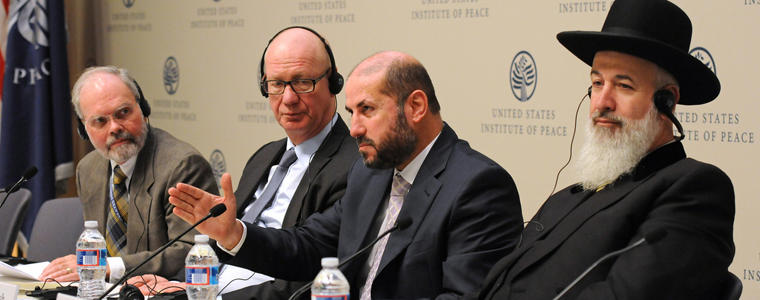Holy Land Faith Leaders at USIP Discuss Building Peace
With the diplomatic peace process between Israelis and Palestinians at a standstill and religiously motivated attacks on the rise, a delegation of senior religious leaders from the Council of Religious Institutions of the Holy Land (CRIHL) gathered at the U.S. Institute of Peace (USIP) on February 28 in a public demonstration of their intention to continue efforts to foster interfaith peace.

With the diplomatic peace process between Israelis and Palestinians at a standstill and religiously motivated attacks on the rise, a delegation of senior religious leaders from the Council of Religious Institutions of the Holy Land (CRIHL) gathered at the U.S. Institute of Peace (USIP) on February 28 in a public demonstration of their intention to continue efforts to foster interfaith peace.
“The very existence of this Council is remarkable,” noted David Smock, the senior vice president of the Religion and Peacemaking Center at USIP.
With its financial and moral support, the Institute was an early backer of interfaith dialogue that produced what is known as the Alexandria Declaration, a pledge by religious leaders from the Holy Land to work together to end violence and promote peace that was signed in Alexandria, Egypt, in 2002. CRIHL is the successor body to the Alexandria Declaration and the subsequent Alexandria Process.
Canon Trond Bakkevig, CRIHL’s convener and a pastor of the Church of Norway, said, “We are promoting peace and a culture of peace…and aid all those who work for peace in the Holy Land.” Arguing that it is important to “say it again and again” that peace remains possible, Bakkevig said of CRIHL: “We have managed to stay together to keep the dialogue going thoughout all of this.”
Several members of the CRIHL delegation spoke at the USIP event:
Mahmoud Habbash. Peace “has to be based on a clear principle of justice, comprehensively, and everybody should get their rights,” said Habbash, the Palestinian minister of Waqf and religious affairs. He said that “no one can accept that peace can be achieved” if only one side of the conflict enjoys freedom, dignity, rights and privileges. And neither side, he added, can “build your life at the expense of others.” Habbash argued that even though “Israel was established at the expense of these [Palestinian] people,” both sides “have to move forward.” Said Habbash, “We have to give up concessions--a little bit--but don’t ask me to give up everything.” A peace settlement that called for restoring the borders of Palestine as they existed in 1967—an area far smaller than pre-Israel Palestine--would be “a very dear and painful price to pay” but one that Palestinians are prepared to accept, he said.
Yona Metzger. The Ashkenazi chief rabbi since 2003, Metzger said he believes there is a desire for peace among Palestinians. “I believe in peace,” he said. But the parties to the conflict must recognize that “peace is not only land. Peace is trust between people.” He condemned attacks on holy sites and places of worship, noting that he had visited a burned mosque in the Israeli city of Haifa and that such attacks are the “antithesis” of Jewish teaching. Metzger described himself as a “devotee” of personal, interfaith meetings, and he said his “hope and dream” is “the establishment of the United Nations for religion.”
Fouad Twal. Twal, the Latin patriarch of the Holy Land and Jordan, said that “as religious leaders, we can have influence on our faithful…to encourage the culture of peace.” He added, “We can prepare a new generation that can accept the other, dialogue [with] the other.” In the Holy Land, he said, “we cannot have peace for one people and not the other….I think we are condemned to live together.” All three of the Abrahamic faiths represented in the CRIHL delegation—Judaism, Christianity and Islam--teach that one should love God, one’s neighbors and even one’s enemies, Twal said. “Otherwise, we go on this cycle, this cycle of violence.”



